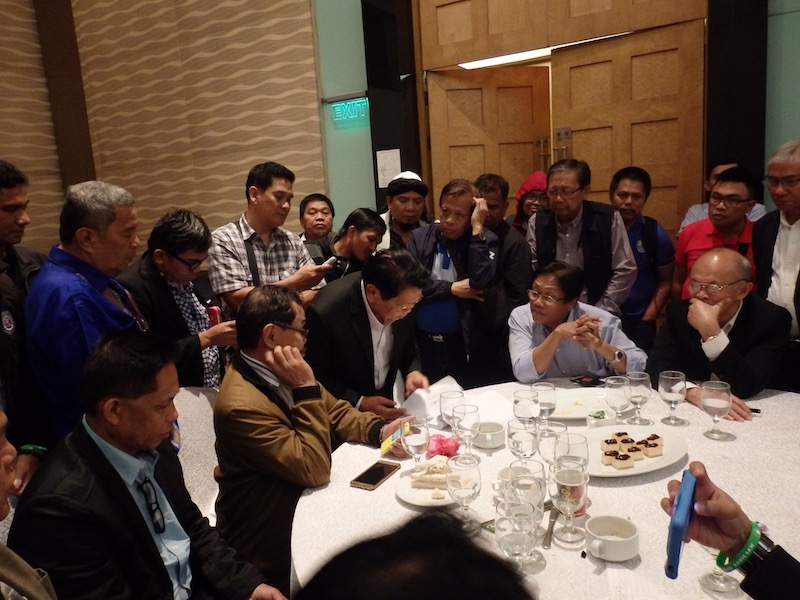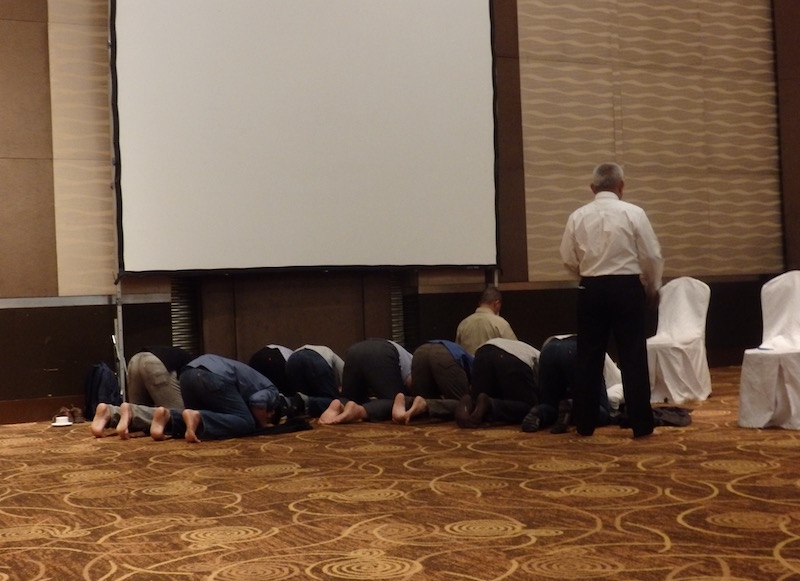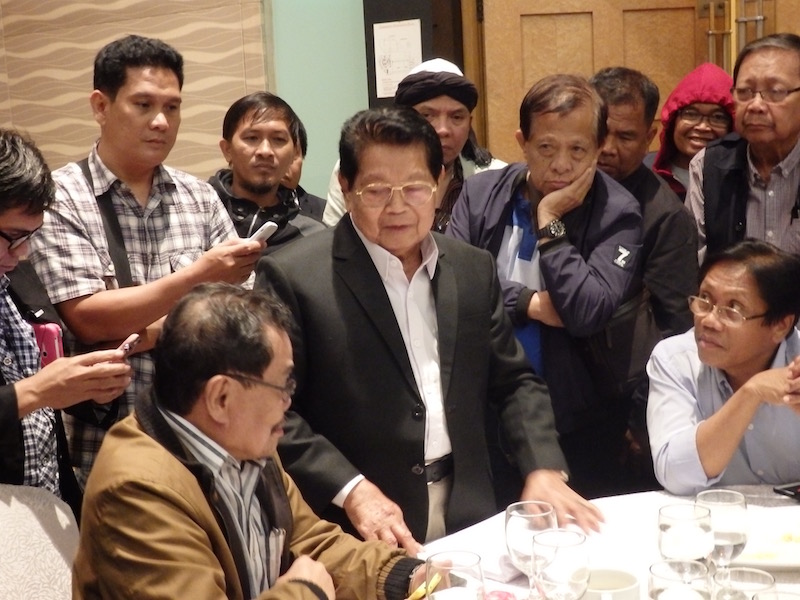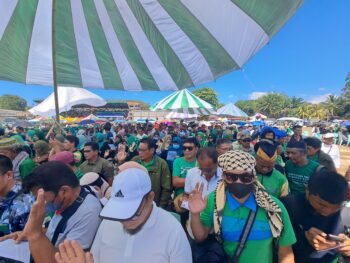ORTIGAS (MindaNews / 10 July) — From ARMM to BARMM.
The new autonomous political entity that will replace the 28-year old Autonomous Region in Muslim Mindanao (ARMM) will be known as the Bangsamoro in the Autonomous Region in Muslim Mindanao (BARMM) as agreed upon by the 28-member Bicameral Conference Committee (bicam) that has been meeting at the Crowne Plaza ballroom since Monday.
The law will no longer be referred to as the Bangsamoro Basic Law (BBL) but Organic Law for the Bangsamoro in the Autonomous Region in Muslim Mindanao or what would likely be referred to as OLBARMM.
House Bill 6475 earlier named the new autonomous political entity as Autonomous Region in the Bangsamoro while Senate Bill 1717 named it Autonomous Region of the Bangsamoro.
The two houses had scheduled July 9 to 13 to come up with the final version of the law as they are eyeing its signing by President Rodrigo Duterte on July 23, the same day he delivers his third State of the Nation Address.
 Ghazali Jaafar, 1st vice chair of the Moro Islamic Liberation Front and chair of the Bangsamoro Transition Commission that drafted the Bangsamoro Basic Law, briefs members of the BTC and staff Monday evening, July 9, 2018, on what transpired at the meeting of the Bicameral Conference Committee that will come up with the final version of the Bangsamoro law. MindaNews photo by CAROLYN O. ARGUILLAS
Ghazali Jaafar, 1st vice chair of the Moro Islamic Liberation Front and chair of the Bangsamoro Transition Commission that drafted the Bangsamoro Basic Law, briefs members of the BTC and staff Monday evening, July 9, 2018, on what transpired at the meeting of the Bicameral Conference Committee that will come up with the final version of the Bangsamoro law. MindaNews photo by CAROLYN O. ARGUILLAS
On Monday, Day 1 of the bicam, the conferees opted to go through the matrix of the three versions — the House and Senate versions compared with the provisions of the proposed BBL of the Bangsamoro Transition Commission (BTC). The 21-member body was tasked through an executive order to craft the draft BBL, as earlier agreed upon by the government (GPH) and Moro Islamic Liberation Front (MILF).
The MILF leads the BTC with 11 members and 10 from the government. Three members of the government nominees were nominated by the Moro National Liberation Front (MNLF) under the Yusoph Jikiri -Muslimin Sema faction. The MNLF under founding chair Nur Misuari declined to nominate members.
The bicameral conferees worked until 10:45 p.m. Monday, going through the matrix and agreeing on a number of provisions but tabled the contentious ones, passing them on to sub-committees to work on them. On Tuesday, the conferees stayed on until near midnight as sub-committees and in plenary, a number of the most contentious issues still tabled for further discussion, with the issue on territory — specifically on the six Lanao del Norte towns and 39 barangays in North Cotabato that voted for inclusion in the 2001 plebsicie — to be elevated to President Duterte if unresolved at their level.
“Parity of esteem,” “Asymmetric” out
But before noon of Monday, the Bangsamoro “parity of esteem” and “asymmetrical political relationship” which they fought for for decades and eventually won through the Comprehensive Agreement on the Bangsamoro (CAB), the peace agreement signed by the government and MILF in March 2014.
Although they were retained in the House version of the Preamble, the Senate version deleted both. The “right to self-determination,” also retained in the House version, was deleted by the Senate.
Several provisions in the BTC-drafted proposed law specifically mention “parity of esteem,” “asymmetric relationship” and “right to self-determination” — the essence of the Bangsamoro struggle.
 Prayers for the Bangsamoro Basic Law at the holding room of the Bangsamoro Transition Commission at the Crowne Plaza Hotel on Monday afternoon, 9 July 2018. MindaNews photo by CAROLYN O. ARGUILLAS
Prayers for the Bangsamoro Basic Law at the holding room of the Bangsamoro Transition Commission at the Crowne Plaza Hotel on Monday afternoon, 9 July 2018. MindaNews photo by CAROLYN O. ARGUILLAS
The bicam agreed on deleting “parity of esteem” and “asymmetric relationship” but tabled for further discussion the “right to self-determination.”
Ghazali Jaafar, the MILF’s first vice chair and concurrent BTC chair, declined to comment on the removal of these key principles they fought for and for which thousands of combatants and civilians died in the last 50 years since the Moro liberation front was founded, millions displaced, most of them repeatedly, a number of them forced to leave their properties behind.
“No comment ako. Tingnan natin,” (Let’s see), Jaafar told MindaNews shortly before 9 p.m. Monday at the holding room of the BTC near the ballroom where the bicameral committee was meeting.
“I do not want to give comments now.
Pag natapos ito then you ask us. I think that is better for all of us kasi kami hindi namin gusto ma discourage yung sa ground. kasi may effect yan (because we do not want to discourage the people on the ground, because that will have an effect). We do not want to give false hopes dyan sa ground,” he said.
Asked for his Day 1 assessment, Jaafar replied: “They want to finish this tomorrow. Mag-overtime kami ngayon.”
“Is that good for the Bangsamoro to hurry this up?” MindaNews asked. The bicam is supposed to meet from Monday to Friday.
“Tingnan natin” (Let’s see), he said. On Tuesday night , Jaafar said the bicam will likely finish by Wednesday.
“Not below the ARMM”
Asked what they have gained thus far, Jaafar replied on Monday night: “ang na-gain namin ngayon it’s not below the ARMM” (what we gained now is it is not below the ARMM) but did not provide details.
“Kasi ang guide nila ngayon is ARMM plus, not less” (Because their guide now is ARMM plus, not less), Jaafar added.
“Where is this confidence coming from that it is not lower than ARMM,” Mindanews asked. He replied: “kasi yung mga binigay sa ARMM binalik, like 9054″ (because what was given ARMM was returned, like RA 9054.”
(On Tuesday night, during the dinner break, Jaafar told MindaNews “the news is good. Definitely it is above ARMM. Plus plus plus.” Asked if it was compliant with the CAB, he replied, “yes of course” but could not give specifics on how the proposed Bangsamoro government is “above ARMM.”
“What is definite now is we will be having our government, Insha Allah,” he said).
 Ghazali Jaafar, 1st vice chair of the Moro Islamic Liberation Front and chair of the Bangsamoro Transition Commission that drafted the Bangsamoro Basic Law, updates Mohagher Iqbal (seated), who chaired the BTC under the Aquino administration and is now chair of the MILF peace implementing panel and BTC member, Monday evening, July 9, 2018, on what transpired at the meeting of the Bicameral Conference Committee that will come up with the final version of the Bangsamoro law. Other members of the BTC and staff listen. MindaNews photo by CAROLYN O. ARGUILLAS
Ghazali Jaafar, 1st vice chair of the Moro Islamic Liberation Front and chair of the Bangsamoro Transition Commission that drafted the Bangsamoro Basic Law, updates Mohagher Iqbal (seated), who chaired the BTC under the Aquino administration and is now chair of the MILF peace implementing panel and BTC member, Monday evening, July 9, 2018, on what transpired at the meeting of the Bicameral Conference Committee that will come up with the final version of the Bangsamoro law. Other members of the BTC and staff listen. MindaNews photo by CAROLYN O. ARGUILLAS
RA 9054 was supposed to be the enabling law of the Final Peace Agreement with the Moro National Liberation Front (MNLF). The MNLF under founding chair Nur Misuari objected to the amendments introduced by Congress, describing the supposedly enhanced or expanded ARMM to be less autonomous than the then existing ARMM that Misuari headed as governor from 1996 until he was arrested off Sabah in November 2001.
The BBL, on the other hand, is supposed to be the enabling law of the CAB, the 2014 peace agreement with the MILF.
What the CAB provides for, and the BTC draft also provides for, is a Bangsamoro that is not less than ARMM or a little bit more than ARMM but one with an autonomy framework that addresses historical injustices committed against the Bangsamoro, provides for a genuine political and fiscal autonomy, with clear delineation of powers and the essence of what they fought for — self-determination, parity of esteem, asymmetric relations, etc.
Rejected
The MILF itself had rejected offers of the Estrada, Arroyo and Aquino administrations for an “enhanced” ARMM as the latter had been criticized as a “failed autonomy” for its structural flaws, including lack of political and fiscal autonomy.
When the Ramos administration’s Executive Secretary Ruben Torres met with Jaafar in Cagayan de Oro on August 2, 1996 for exploratory talks on the possibility of the MILF’s agreeing to be part of the soon-to-be signed Final Peace Agreement of the government and Misuari’s MNLF (it was signed September 2, 1996), the MILF turned down the offer.
This eventually led to the formal peace negotiations with the MILF that was then chaired by founder Salamat Hashim, Misuari’s vice chair in the 1970s who broke away and set up the MILF after the failed implementation of the 1976 Tripoli Agreement.
Jaafar was the MILF’s first peace panel chair.
Asked how he felt about the change in name from Bangsamoro to BARMM, Jaafar said Monday night: “as far as I am concerned, what’s in a name? Sabi ni Deng Xiaoping, hindi importante color ng pusa ay black or white. Ang importante, marunong sya maghuli ng daga (Deng Xiaoping said it does not matter if the cat is black or white, what is important is it knows how to catch mice). I believe in that.”
He added, “at saka very slight naman ang change. Andyan ang autonomy” (besides, the change is very slight.
Autonomy is still there).
Maguindanao Rep. Bai Sandra Sema on Monday told MindaNews they were not able to succeed in getting “parity of esteem” and “asymmetric relationship” restored. She said she reserved her fight for other matters like ensuring the parliamentary system in the proposed Bagnsamoro government.
But the parliamentary structure of government had already been assured as the Senate and House versions of the proposed law agreed with the BTC draft on the structure of the Bangsamoro government.
“Get the most out of both”
Sema, wife of MNLF commander Muslimin Sema, MNLF secretary-general when Misuari negotiated the 1996 peace agreement, said she told the Bicameral Committee that “we have a chance to leave a legacy of peace or a legacy of unpeace.”
Sema said the President has shown his sincerity in seeing the Bangsamoro law passed. Once this is passed, she said, “let the good revolutionary leaders who have the heart for the people implement this” and when the shift to federalism is done “i-elevate din namin yung aming powers” (we will also raise the level of the Bangsamoro powers)
Asked on the possibility that the Bangsamoro law track might be subsumed under the federal track, Sema replied: “let us get the most that we can… if the other regions who did not even fight for it can get the leverage of federalism, how much more we who fought for it? So yung two trains, get the most out of both,” she replied.
Just before the bicameral body started its session on Monday, Presidential Adviser on the Peace Process Jesus Dureza, who visited the BTC at its holding room, told MindaNews that what the Bangsamoro can’t get now, they can push for later under the federal system of government.
Dureza later told MindaNews he brought in MILF chair Al Haj Murad Ebrahim and Muslimin Sema, former chair of an MNLF faction, inside the venue of the bicameral meet “to meet members of the bicam.
”
“Handshake is a good way to help push BBL,” Dureza said. (Carolyn O. Arguillas / MindaNews)
